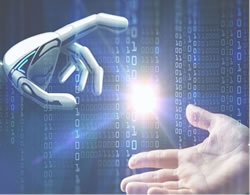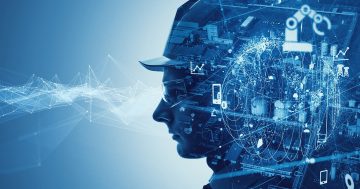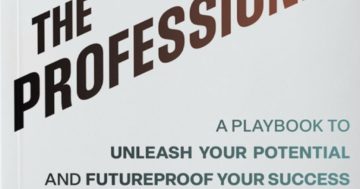Jessica Miller-Merrell* makes the way ahead for a positive AI, seeing it rapidly lifting the role of humans and letting them spend more time together being just that: Human!.
 Let me first say that I love AI.
Let me first say that I love AI.
I had a chatbot on my website before a lot of people knew what a chatbot was.
I’ve been building automation into my own business using tools like Zapier before the platforms we used had automation available. I think the pandemic accelerated development for AI assistive technologies and I think they can be put to good use.
Today, we have reached “peak AI” in our society and in our workplaces.
Ask anyone who works in HR about adopting new technologies and they will tell you that change can be scary, but it can also be managed.
Why Understanding AI Tools is Key to HR Success
In September of 2018, I attended an HR technology conference where the phrases “machine learning” and “artificial intelligence” were also at peak hype levels.
Artificial intelligence is focused on building human-like intelligence focused on automation.
There are a lot of use cases for artificial intelligence in HR technology in the areas of talent sourcing, candidate evaluation, employee engagement, benefits enrolment, on-boarding, and employee selfservice.
Imagine a technology that can quickly answer employee questions using AI.
AI technology can help us understand, respond to, and customise responses to employee questions (for example, an employee who is looking for information on how to find their W-2).
Fast forward to 2023, and the media is full of stories about new AI technology, generative AI tools like OpenAI’s ChatGPT , Microsoft’s Bing chat and Google’s Bard AI assistant.
There’s also a resurgence of “robots will take our jobs” (and let me say quickly here, robots are not going to replace humans in the near future).
There are some problematic areas in AI, but there are many more ways to think about using AI as a tool to help us be more productive and to automate tasks that many of us in HR spend a lot of time on.
Warnings About the Use of AI in HR and Recruitment
One of my favorite interviews for the Workology Podcast in 2021 was with Merve Hickok: Episode 286: Ethics and Bias in Artificial Intelligence (AI) Technology.
Merve is the founder of AIEthicist.org and a business process analyst at High Sierra Industries.
She is an independent consultant, lecturer and speaker on AI ethics and bias and its implications on individuals, organisations and society.
She’s also a senior researcher at the Centre for AI and Digital Policy and has over 15 years of global level senior experience with a particular focus on HR technologies, recruitment and diversity and inclusion.
In the podcast, Merve talks about some of the flaws in AI that can lead to exclusion of people with disabilities and other marginalised groups, but also what a healthy balance of ethical policies and artificial intelligence looks like for HR.
She said, “I always say you can use AI in a very positive way to understand your company first. You know, start with that. Use your data to understand … are there any wage gaps or what kind of people are being promoted?
What kind of people are being given development opportunities? What is the composition of your company and your applicants versus those who are exiting the company?”
How AI Can Help HR Keep the Human in Human Resources
In Artificial Intelligence and How it Can Revolutionise Human Resources, I wrote about the different types of AI and its applications for human resources.
Artificial intelligence and the technological innovation it can bring to the workplace can have a positive impact on human resources.
For instance, think about the process of recruitment.
Anybody that works in human resources knows that the recruitment process is long and costly, as well as being boring.
It all starts by going through thousands of applications to find the right candidates.
Then you have to organize the interviews and train new employees.
Nearly one in four organisations reported using automation or AI to support HR-related activities, including recruitment and hiring, according to a 2022 survey by SHRM.
In a February 2023 survey from ResumeBuilder, business leaders said their companies have a variety of uses for ChatGPT.
Of companies that currently use ChatGPT, 66% use it for writing code, while 58% use it for copywriting/content creation, 57% for customer support, and 52% for creating summaries of meetings or documents.
The majority of companies also use ChatGPT to facilitate hiring; 77% say it helps them write job descriptions, 66% draft interview requisitions, and 65% respond to applicants.
Why Generative AI Policies Are Important to HR
Should companies trust their employees are using AI tools in a way that doesn’t put important information at risk?
A poll of 62 HR leaders in February 2023 by consulting firm Gartner found that about half of them were formulating guidance on employees’ use of ChatGPt, Bloomberg reported.
If you take a look at every aspect of the HR value chain, ask how you can alleviate the repetitive tasks to spend more time with candidates.
One of the major future skills needed will be critical thinking.
Your company’s AI can handle the basics, but we will need to upskill our human workforce to handle the complex. There aren’t enough people currently being educated for AI and we see that as a skills shortage, so if you want to be adaptive for the future workforce, this is something you should consider now.
The bottom line is “have a clear AI strategy.”
We have historically seen “mobile first” and that is rapidly shifting to “AI first.”
Be prepared to tackle the obstacles your company will face with artificial intelligence.
At the end of the day, we’re still dealing with people and people have feelings that must be considered when you’re adapting to a new technology. SHRM has an excellent resource on How to Create the Best ChatGPT Policies.
I think the most important thing to understand about AI is that it has its flaws, but they can be cross-checked and moderated by actual humans.
Having a generative AI policy for your workplace is a great start (and a good way to ensure that confidential and proprietary information about your company isn’t put out into the world by accident).
As you work with your HR tech vendors, it’s important to understand how they use AI and how it is applied to your use cases specifically.
If your ATS uses artificial intelligence to scan human faces – in video assessments of candidates, for example – how do you know that what it scans for is not excluding protected classes?
We must be able to answer these questions in order to harness the technology available to make us more productive and make our jobs easier.
I cover a lot about AI (including a checklist of questions to ask your HR vendors about AI tech) in Chapter 11 (Artificial Intelligence and Other New Recruiting Technology) of my book, Digitizing Talent: Creative Strategies for the Digital Recruiting Age (SHRM; 2023)
* Jessica Miller-Merrell is the founder of Workology, a digital resource that reaches more than a half million HR and workplace leaders each month. She lives in Austin, Texas, with her husband, daughter, and an assortment of furry family member.










